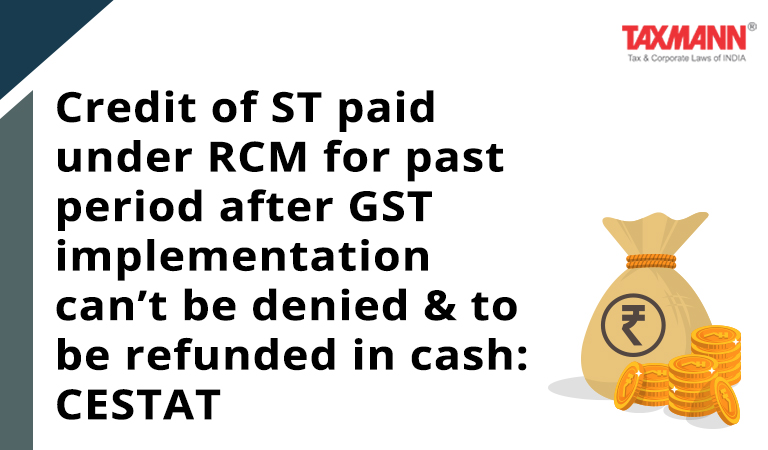Credit of ST paid under RCM for past period after GST implementation can’t be denied & to be refunded in cash: CESTAT
- Blog|News|GST & Customs|
- 2 Min Read
- By Taxmann
- |
- Last Updated on 30 December, 2021

Case Details: Circor Flow Technologies India (P.) Ltd. v. Principal Commissioner of GST & Central Excise - [2021] 133 taxmann.com 327 (Chennai - CESTAT)
Judiciary and Counsel Details
-
- Ms. Sulekh Beevi C.S., Judicial Member
- Paul Thangam and Aravind Thangam for the Appellant.
- Ms. K. Komathi, (AR) for the Respondent.
Facts of the Case
The appellant was engaged in the manufacture of valves and was holding registration under Central Excise and Service Tax. It imported software for which service tax was liable to be paid under reverse charge mechanism but it was paid in March 2019. After introduction of GST, the appellant could not avail cenvat credit and therefore, it filed an application for refund of the amount of which was eligible for credit. The refund claim was rejected by the adjudicating authority stating that the tax has been voluntarily paid and that no credit is eligible in the GST regime. On appeal filed before the Commissioner (Appeals), the said view was upheld. Hence the appellant filed appeal before the Tribunal.
CESTAT Held
The Honorable Tribunal observed that Section 142 (3) of GST Act provides how to deal with claims of refund of service tax of tax and duty/credit under the erstwhile law and it is provided that such claims have to be disposed in accordance with the provisions of existing law and any amount eventually accruing has to be paid in cash. In the present case, there was no allegation that the credit was not eligible to the appellant. It was merely stated that tax had been paid voluntarily and therefore credit would not be available under the GST regime. Though credit would not be available as Input Tax Credit under GST law, the credit under the erstwhile Cenvat Credit Rules would be available to the appellant. Therefore, it was held that such credit would be processed under section 142 (3) of GST Act, 2017 and refunded in cash to the appellant.
Disclaimer: The content/information published on the website is only for general information of the user and shall not be construed as legal advice. While the Taxmann has exercised reasonable efforts to ensure the veracity of information/content published, Taxmann shall be under no liability in any manner whatsoever for incorrect information, if any.

Taxmann Publications has a dedicated in-house Research & Editorial Team. This team consists of a team of Chartered Accountants, Company Secretaries, and Lawyers. This team works under the guidance and supervision of editor-in-chief Mr Rakesh Bhargava.
The Research and Editorial Team is responsible for developing reliable and accurate content for the readers. The team follows the six-sigma approach to achieve the benchmark of zero error in its publications and research platforms. The team ensures that the following publication guidelines are thoroughly followed while developing the content:
- The statutory material is obtained only from the authorized and reliable sources
- All the latest developments in the judicial and legislative fields are covered
- Prepare the analytical write-ups on current, controversial, and important issues to help the readers to understand the concept and its implications
- Every content published by Taxmann is complete, accurate and lucid
- All evidence-based statements are supported with proper reference to Section, Circular No., Notification No. or citations
- The golden rules of grammar, style and consistency are thoroughly followed
- Font and size that’s easy to read and remain consistent across all imprint and digital publications are applied



 CA | CS | CMA
CA | CS | CMA
